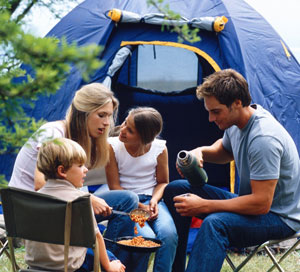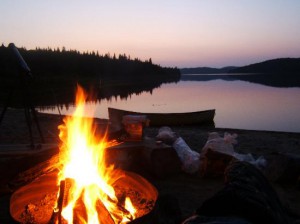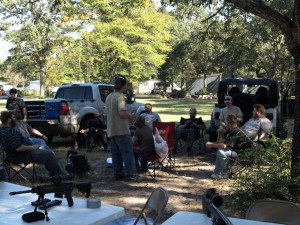Camping During the Zombiepocalypse
 From Under the Desk of Commander RC Murphy:
From Under the Desk of Commander RC Murphy:
Predictions of the pending troubles state that at the height of the zombie uprising, the undead will overrun major cities. They will run us out of our houses and, in effect, take over our lives as we know it. Staying in the city would be impossible. Heck, some would say it would be suicidal. Your only chance to ensure your family’s safety is to get out.
The ZSC has escape routes being mapped, along with bases for crew members to gather in safety. However, it is essential that you know how to live in the wilderness should you be unable to reach a secure building or ZSC stronghold. These skills will also come in handy should you find yourself ousted from your home after a natural disaster. Shelters fill up quickly, its best to be prepared.
First thing’s first, you’ll need to scout possible camping sites outside of your city. Find one or two choices in each direction, preferably on the same route you will have to take to reach the nearest Safe Haven provided by the ZSC, or Rescue Agencies. An ideal campsite will be near to water and with plenty of trees around it to provide shelter and firewood. Pick a place a distance from the road. This will not only give you privacy, but also warning if someone or something unwanted approaches your camp. Zombies aren’t exactly quiet tromping through a forest.
Below we’ve included a list of supplies you should consider in addition to what you have in your Go Bags, which should include things like toilet paper, matches, medications, toiletries, clothing, etc…
- Tent: tent fly, poles, stakes and ropes. Take a practice run in your back yard after purchasing the tent so you know how to set it up. This will be useful if you are forced to make camp in the dark. Tents are sized by the number of average-sized adults that can lie down across the bottom of the tent. Like sardines. Pick a tent that is one or two people larger than the number you plan to have sleep in there. Make that number even bigger if you plan to put your luggage in the tent with you.
- Hammer/Hatchet: To drive tent stakes. We suggest a sturdy hatchet, which will do double duty to cut wood into kindling for fires.
- Sleeping Bags: Bags are rated by the highest and lowest temperatures sleepers inside can withstand. Look for a temperature range that fits in the area you live in. Make sure that the lowest temperature rating of the sleeping bag coincides with the lowest average temperature of where you will be camping or lower, just to be safe.
- Pillows: Comfort is key. If you have a sore neck/back you can’t run from the undead. A small travel pillow will roll up in your sleeping bag to reduce packing space.
- Tarp: A billion and one uses. They can keep your supplies dry. Be fashioned into a privacy shade for bathing and changing. A tarp can even be used to set up an emergency tent should yours meet with an accident. We really like multipurpose items such as these.
- Light Sources: For the first couple of weeks, flashlights that run on batteries will suffice. However, if you are forced to camp for long periods of time you will need either a lantern that runs on fuel, or to find a flashlight that doesn’t run on batteries.
- Ice Chest: Obviously, carrying perishable food for too long is not an option. An ice chest is good for storing your food if you have a large group to feed. (Please note that it will not keep an animal from breaking into your food stores. Food will need to be raised off the ground to prevent bears and the like from stealing it. Also, keep your camp free of food smells. Pack everything, even garbage, away after meals.)
- Water Jugs: At some point in the preparation process, you all will tire of us harping about water. The fact is, without water you’re going to die and then come back, forcing one of us to put your zombie self down. We don’t want that. Pack a few gallons of water in your camping kit and save the bottles. They can be refilled with purified/boiled water.
- A Grill: You don’t need to pack an entire barbecue or gas stove in order to be able to cook. Grab just the grill off your barbecue. When you set up camp, make a pit of rocks with a diameter roughly the size of the grill (the grill should rest on top of the pit without falling into the flames). Ta-da! You can cook, purify water, and stay warm without having to figure out just how you’re going to carry that bulky camp stove.
- Pots and Pans: Yes, we are aware that these items are heavy. Consider the long run, though. It is impossible to tell when, if ever, you will be able to reenter the city again if it is lost to the undead. Look at Atlanta in “The Walking Dead”. So make room for at least one good, large cooking pot and a cast-iron skillet. If you pack carefully, both should fit in the ice chest with your food, limiting what you have to carry.
- Cooking Utensils: You should already have a knife in your Go Bag, but in addition, pack tongs, a spatula, a large spoon, and a can opener. Go for the heavy-duty, can handle an elephant standing on them type of utensils. Being on the run is hell on equipment. Plus, a sturdy spoon could end up a weapon in a pinch.
- Aluminum Foil: Oh how we love thee, foil. Let me count the ways… Sounds weird to write poetry for the silver stuff, but it will make cooking in the outdoors so much easier. Got hard vegetables (squash, potatoes, etc…), wrap them in foil and put them down on the hot coals while you cook what meat you have on the grill. Fish is impossible to cook on a grill without losing some. Solution? Foil! You get the point? Foil has other uses. Rumor is one of the commanders has made cannon charges with foil… we do not suggest trying this at home without expert assistance.
- Eating Utensils: This includes plates, cups, and silverware (spork!). Make sure everything is, again, heavy duty and easy to sanitize.
- Soap: Lets face it, you need soap. Without it you risk courting a number of nasty diseases that could be killed by a simple scrub and rinse (of your cooking materials as well as yourself).
- Zip-loc bags: These multipurpose items not only help you organize the items in your Go Bag, but they also allow you to portion foods before storing them. This way you can stash next week’s dried fruit rations somewhere safe without worry.
- Towels: A stack of towels should keep you for a while. They can be used for personal hygiene, cleaning, heck even as a pillow or a blanket if need be. Cut a large towel into smaller squares to make dishrags and potholders.
These are just the basics to keep you going for a little while. It is better to be prepared for the worst than to be caught with your pants down, right?


